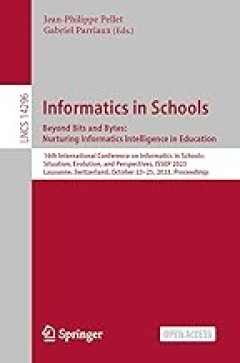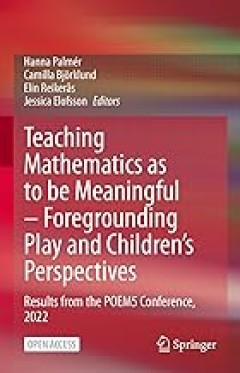Filter by

Primary Physical Science Education
This open access book is the first of two volumes that integrates a study of direct encounters with Primary Forces of Nature, Wind, Light, Rain, Heat and Cold, Water, etc., with imaginative narrative forms of communication. The approach developed in this book shows how the growth of cognitive tools (first of mythic and then of romantic forms of understanding) lets children make sense of expe…
- Edition
- -
- ISBN/ISSN
- 978-3-031-43952-0
- Collation
- XIV, 347
- Series Title
- -
- Call Number
- -

Sex Differences in Reading and Math Test Scores of Children
This open access book examines why reading and math test scores for boys and girls have differed since the origins of testing in the United States. It details the pattern of differences that have remained largely unchanged for more than 100 years in the United States and worldwide. The book explores why boys have modestly larger math test score means than girls, and why girls have far larger re…
- Edition
- -
- ISBN/ISSN
- 978-3-031-41271-4
- Collation
- XII, 108
- Series Title
- -
- Call Number
- -

Leadership in Educational Contexts in Finland
This open access book provides a comprehensive overview and in-depth coverage of contemporary aspects of leadership in the field of education in Finland. It brings together Finnish scholars to critically explore and discuss leadership in education in the context of the Finnish education system and in relation to international discourses around the topic. It discusses the phenomenon of leade…
- Edition
- -
- ISBN/ISSN
- 978-3-031-37603-0
- Collation
- XI, 390
- Series Title
- -
- Call Number
- -

Fortbildungen für KulturSchule
In diesem Open-Access-Buch gibt eine Evaluationsstudie Auskunft, wie teilnehmende Lehrkräfte Fortbildungen erleben, die auf die KulturSchul-Entwicklung zielen. Welche Perspektiven bauen diese auf? Und welche internen Unterstützungsmaßnahmen trifft die Schule, damit sich die Lernkultur ändern kann? Die Fortbildungsreihen im Landesprogramm «KulturSchule Hessen» legen die Grundlage dafür…
- Edition
- -
- ISBN/ISSN
- 978-3-658-42220-2
- Collation
- XI, 243
- Series Title
- -
- Call Number
- -

Informatics in Schools. Beyond Bits and Bytes: Nurturing Informatics Intellig…
This book constitutes the proceedings of the 16th International Conference on Informatics in Schools: Situation, Evolution and Perspectives, ISSEP 2023, held in Lausanne, Switzerland, during October 23–25, 2023. The 14 full papers presented in this book were carefully reviewed and selected from 47 submissions. They are organized in four topical sections named: artificial intelligence and i…
- Edition
- -
- ISBN/ISSN
- 978-3-031-44899-7
- Collation
- XX, 195
- Series Title
- -
- Call Number
- -

Sinnbilder des Alltagsverstandes
Das vorliegende Open-Access-Buch folgt der übergreifenden Fragestellung, ob ein Kritiklernen im institutionell gebundenen politischen Unterricht möglich ist. Diese Fragestellung wird nicht aus einer institutionen- und schulsoziologischen, sondern aus einer lerntheoretischen und politikdidaktischen Perspektive entwickelt. Der Analysefokus richtet sich damit auf die Frage, wie subjektorientiert…
- Edition
- -
- ISBN/ISSN
- 978-3-658-42257-8
- Collation
- XII, 228
- Series Title
- -
- Call Number
- -

Postdigital Participation in Education
This open access book examines the interrelations and correlations of the postdigital condition and its relationship to education, with a particular focus on participation. Contributions reflect on how educational institutions are affected by the recent transformations of media technologies and practices, and how at the same time institutions such as schools and universities are supposed to ena…
- Edition
- -
- ISBN/ISSN
- 978-3-031-38051-8
- Collation
- XXV, 250
- Series Title
- -
- Call Number
- -

Teaching Mathematics as to be Meaningful – Foregrounding Play and Children�…
This open access book’s theme is Teaching mathematics as to be meaningful – foregrounding children’s play and perspectives. It discusses the relation between teachers, children and mathematical content within the context of play with a particular focus on the framing of these relations within this context, which is an important theme in the debate on whether teaching should be integrated …
- Edition
- -
- ISBN/ISSN
- 978-3-031-37662-7
- Collation
- XII, 260
- Series Title
- -
- Call Number
- -

First-in-Family Students, University Experience and Family Life
This open access book, now in its second edition, offers a comprehensive overview of the experiences of First in Family (FiF) or first-generation students in higher education. It draws upon narratives of students and their family members and spans the entire university student life cycle (pre-entry, commencement, progression and graduation) with a focus on specific cohorts including mature-aged…
- Edition
- -
- ISBN/ISSN
- 978-3-031-34450-3
- Collation
- XXIII, 294
- Series Title
- -
- Call Number
- -

Schools and Society During the COVID-19 Pandemic
This open access book provides an analysis of the effects of the COVID-19 Pandemic on diverse education systems, and of the results of the policies adopted to sustain educational opportunities. Through a series of diverse national case studies, the book examines the preexisting fragilities and vulnerabilities in educational structures which shaped the nature of the varied responses, around the …
- Edition
- -
- ISBN/ISSN
- 978-3-031-42670-4
- Collation
- VI, 262
- Series Title
- -
- Call Number
- -
 Computer Science, Information & General Works
Computer Science, Information & General Works  Philosophy & Psychology
Philosophy & Psychology  Religion
Religion  Social Sciences
Social Sciences  Language
Language  Pure Science
Pure Science  Applied Sciences
Applied Sciences  Art & Recreation
Art & Recreation  Literature
Literature  History & Geography
History & Geography